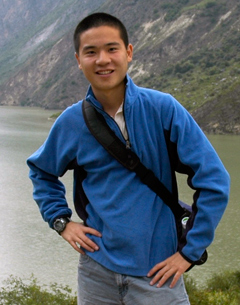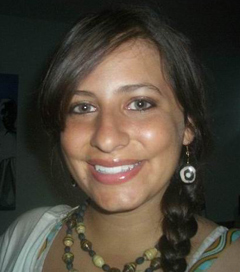Watson Fellows to Document World-Wide Chinese Communities, Child Soldier Reintegration Policies

As Thomas J. Watson Foundation Travel Grant for Research Fellows, Bien, pictured at left, and Littman, pictured below, will have the opportunity to independently research these topics for 12 months in 2008-09. Each year, more than 1,000 college seniors apply to the Watson program, but only 50 fellowships are awarded.
Bien’s project, titled “Documenting the Chinese Diaspora: A Photographic Ethnography of Chinatowns” will take him to Chinese populations in Peru, Paraguay, Brazil, Italy, Ethiopia, Australia, New Zealand and Malaysia. He will explore the similarities and differences of these communities primarily through interactions with community members, photography and audio recordings.
What does it mean to be of Chinese descent in Ethopia? In Italy? I want to know, says Bien, who is majoring in East Asian studies. I want to document and understand how these scattered Chinatowns have evolved and adjusted to local conditions, and I want to observe and experience the livelihoods of Chinese communities around the world, with whom I share a common cultural heritage.
Littman’s project, titled “Victim and Perpetrator: Reintegrating the Former Child Soldier, will take her to Sierra Leone, Liberia and Guinea. In these African countries, governments and rebel groups abduct or forcibly recruit children into their armed forces. Child soldiers who survive the fighting often face mixed reactions when they return home.
Some may sympathize with these children as victims of conflict, while others may stigmatize them as perpetrators of crimes, Littman explains. It is crucial to develop reintegration programs that successfully take this complex reality into account. I want to explore the hows and whys of reintegration efforts.
 Littman will analyze the factors contributing to the development of policies and programs aimed at facilitating the reintegration of former child soldiers into society. She will speak to aid workers, program administrators and policymakers directly involved in shaping, funding and implementing policies and programs.
Littman will analyze the factors contributing to the development of policies and programs aimed at facilitating the reintegration of former child soldiers into society. She will speak to aid workers, program administrators and policymakers directly involved in shaping, funding and implementing policies and programs.
One of the major challenges of the fellowship is overcoming language barriers.
Knowing the French language is necessary in Guinea, and Littman is preparing by studying at home and working with a tutor in Africa. English is the official language in Sierra Leone and Liberia.
Bien learned Spanish in San Marcos, Nicaragua prior to enrolling at Wesleyan.
When I was in Nicaragua, some children asked me to write something in Chinese, and I felt ashamed to respond that I knew no Chinese characters other than my name, Bien recalls. What kind of Chinese-American couldnt even write Chinese? I began to regret not knowing more about my Chinese heritage and this helped shape my interest in the Chinese diaspora and immigrant Chinese communities.
At Wesleyan, Bien studied Mandarin Chinese, and spent an additional two summers in Beijing studying the language in intensive language programs.
The Wesleyan Selection Committee nominated Bien and Littman for the Watson Fellowship in October 2007 based on their project proposals and interviews. Projects need to demonstrate serious creativity in the subject area chosen, challenge the student on many fronts, and be a personal stretch.
The winners were announced in March. Each Fellow receives $25,000 for the year of travel and exploration.
We are thrilled Cedric and Rebecca will get to spend a year after Wesleyan as Watson Fellows, says Louise Brown, associate dean of the college. As fellows, they will get to travel abroad and explore a subject about which they are passionate. What an amazing opportunity for them!
In addition to their academic achievements, Watson Fellows have been leaders on- and off- campus. This years 50 fellows come from 23 states and five foreign countries.
The awards are long-term investments in people, not research, says Rosemary Macedo, executive director of the Watson Fellowship Program and a former Watson Fellow. We look for people likely to lead or innovate in the future and give them extraordinary independence in pursuing their interests. They must have passion, creativity, and a feasible plan. The Watson Fellowship affords an unequalled opportunity for global experiential learning.
The Thomas J. Watson Fellowship Program was begun in 1968 by the children of Thomas J. Watson, Sr., the founder of International Business Machines Corp., and his wife, Jeannette K. Watson, to honor their parents long-standing interest in education and world affairs.
More information on the Watson Fellowship is online at http://www.watsonfellowship.org/site/index.html.By Olivia Drake, The Wesleyan Connection editor

